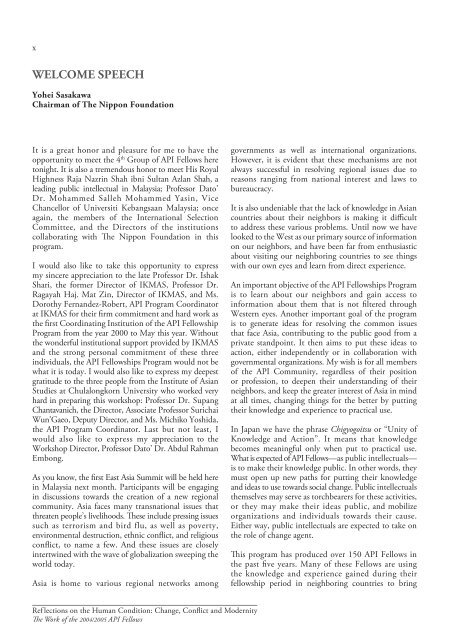Reflections on the Human Condition - Api-fellowships.org
Reflections on the Human Condition - Api-fellowships.org
Reflections on the Human Condition - Api-fellowships.org
You also want an ePaper? Increase the reach of your titles
YUMPU automatically turns print PDFs into web optimized ePapers that Google loves.
10<br />
x<br />
WELCOME SPEECH<br />
Yohei Sasakawa<br />
Chairman of The Nipp<strong>on</strong> Foundati<strong>on</strong><br />
It is a great h<strong>on</strong>or and pleasure for me to have <strong>the</strong><br />
opportunity to meet <strong>the</strong> 4 th Group of API Fellows here<br />
t<strong>on</strong>ight. It is also a tremendous h<strong>on</strong>or to meet His Royal<br />
Highness Raja Nazrin Shah ibni Sultan Azlan Shah, a<br />
leading public intellectual in Malaysia; Professor Dato’<br />
Dr. Mohammed Salleh Mohammed Yasin, Vice<br />
Chancellor of Universiti Kebangsaan Malaysia; <strong>on</strong>ce<br />
again, <strong>the</strong> members of <strong>the</strong> Internati<strong>on</strong>al Selecti<strong>on</strong><br />
Committee, and <strong>the</strong> Directors of <strong>the</strong> instituti<strong>on</strong>s<br />
collaborating with The Nipp<strong>on</strong> Foundati<strong>on</strong> in this<br />
program.<br />
I would also like to take this opportunity to express<br />
my sincere appreciati<strong>on</strong> to <strong>the</strong> late Professor Dr. Ishak<br />
Shari, <strong>the</strong> former Director of IKMAS, Professor Dr.<br />
Ragayah Haj. Mat Zin, Director of IKMAS, and Ms.<br />
Dorothy Fernandez-Robert, API Program Coordinator<br />
at IKMAS for <strong>the</strong>ir firm commitment and hard work as<br />
<strong>the</strong> first Coordinating Instituti<strong>on</strong> of <strong>the</strong> API Fellowship<br />
Program from <strong>the</strong> year 2000 to May this year. Without<br />
<strong>the</strong> w<strong>on</strong>derful instituti<strong>on</strong>al support provided by IKMAS<br />
and <strong>the</strong> str<strong>on</strong>g pers<strong>on</strong>al commitment of <strong>the</strong>se three<br />
individuals, <strong>the</strong> API Fellowships Program would not be<br />
what it is today. I would also like to express my deepest<br />
gratitude to <strong>the</strong> three people from <strong>the</strong> Institute of Asian<br />
Studies at Chulal<strong>on</strong>gkorn University who worked very<br />
hard in preparing this workshop: Professor Dr. Supang<br />
Chantavanich, <strong>the</strong> Director, Associate Professor Surichai<br />
Wun’Gaeo, Deputy Director, and Ms. Michiko Yoshida,<br />
<strong>the</strong> API Program Coordinator. Last but not least, I<br />
would also like to express my appreciati<strong>on</strong> to <strong>the</strong><br />
Workshop Director, Professor Dato’ Dr. Abdul Rahman<br />
Emb<strong>on</strong>g.<br />
As you know, <strong>the</strong> first East Asia Summit will be held here<br />
in Malaysia next m<strong>on</strong>th. Participants will be engaging<br />
in discussi<strong>on</strong>s towards <strong>the</strong> creati<strong>on</strong> of a new regi<strong>on</strong>al<br />
community. Asia faces many transnati<strong>on</strong>al issues that<br />
threaten people’s livelihoods. These include pressing issues<br />
such as terrorism and bird flu, as well as poverty,<br />
envir<strong>on</strong>mental destructi<strong>on</strong>, ethnic c<strong>on</strong>flict, and religious<br />
c<strong>on</strong>flict, to name a few. And <strong>the</strong>se issues are closely<br />
intertwined with <strong>the</strong> wave of globalizati<strong>on</strong> sweeping <strong>the</strong><br />
world today.<br />
Asia is home to various regi<strong>on</strong>al networks am<strong>on</strong>g<br />
Ref lecti<strong>on</strong>s <strong>on</strong> <strong>the</strong> <strong>Human</strong> C<strong>on</strong>diti<strong>on</strong>: Change, C<strong>on</strong>flict and Modernity<br />
The Work of <strong>the</strong> 2004/2005 API Fellows<br />
governments as well as internati<strong>on</strong>al <strong>org</strong>anizati<strong>on</strong>s.<br />
However, it is evident that <strong>the</strong>se mechanisms are not<br />
always successful in resolving regi<strong>on</strong>al issues due to<br />
reas<strong>on</strong>s ranging from nati<strong>on</strong>al interest and laws to<br />
bureaucracy.<br />
It is also undeniable that <strong>the</strong> lack of knowledge in Asian<br />
countries about <strong>the</strong>ir neighbors is making it difficult<br />
to address <strong>the</strong>se various problems. Until now we have<br />
looked to <strong>the</strong> West as our primary source of informati<strong>on</strong><br />
<strong>on</strong> our neighbors, and have been far from enthusiastic<br />
about visiting our neighboring countries to see things<br />
with our own eyes and learn from direct experience.<br />
An important objective of <strong>the</strong> API Fellowships Program<br />
is to learn about our neighbors and gain access to<br />
informati<strong>on</strong> about <strong>the</strong>m that is not filtered through<br />
Western eyes. Ano<strong>the</strong>r important goal of <strong>the</strong> program<br />
is to generate ideas for resolving <strong>the</strong> comm<strong>on</strong> issues<br />
that face Asia, c<strong>on</strong>tributing to <strong>the</strong> public good from a<br />
private standpoint. It <strong>the</strong>n aims to put <strong>the</strong>se ideas to<br />
acti<strong>on</strong>, ei<strong>the</strong>r independently or in collaborati<strong>on</strong> with<br />
governmental <strong>org</strong>anizati<strong>on</strong>s. My wish is for all members<br />
of <strong>the</strong> API Community, regardless of <strong>the</strong>ir positi<strong>on</strong><br />
or professi<strong>on</strong>, to deepen <strong>the</strong>ir understanding of <strong>the</strong>ir<br />
neighbors, and keep <strong>the</strong> greater interest of Asia in mind<br />
at all times, changing things for <strong>the</strong> better by putting<br />
<strong>the</strong>ir knowledge and experience to practical use.<br />
In Japan we have <strong>the</strong> phrase Chigyogoitsu or “Unity of<br />
Knowledge and Acti<strong>on</strong>”. It means that knowledge<br />
becomes meaningful <strong>on</strong>ly when put to practical use.<br />
What is expected of API Fellows—as public intellectuals—<br />
is to make <strong>the</strong>ir knowledge public. In o<strong>the</strong>r words, <strong>the</strong>y<br />
must open up new paths for putting <strong>the</strong>ir knowledge<br />
and ideas to use towards social change. Public intellectuals<br />
<strong>the</strong>mselves may serve as torchbearers for <strong>the</strong>se activities,<br />
or <strong>the</strong>y may make <strong>the</strong>ir ideas public, and mobilize<br />
<strong>org</strong>anizati<strong>on</strong>s and individuals towards <strong>the</strong>ir cause.<br />
Ei<strong>the</strong>r way, public intellectuals are expected to take <strong>on</strong><br />
<strong>the</strong> role of change agent.<br />
This program has produced over 150 API Fellows in<br />
<strong>the</strong> past five years. Many of <strong>the</strong>se Fellows are using<br />
<strong>the</strong> knowledge and experience gained during <strong>the</strong>ir<br />
fellowship period in neighboring countries to bring

















